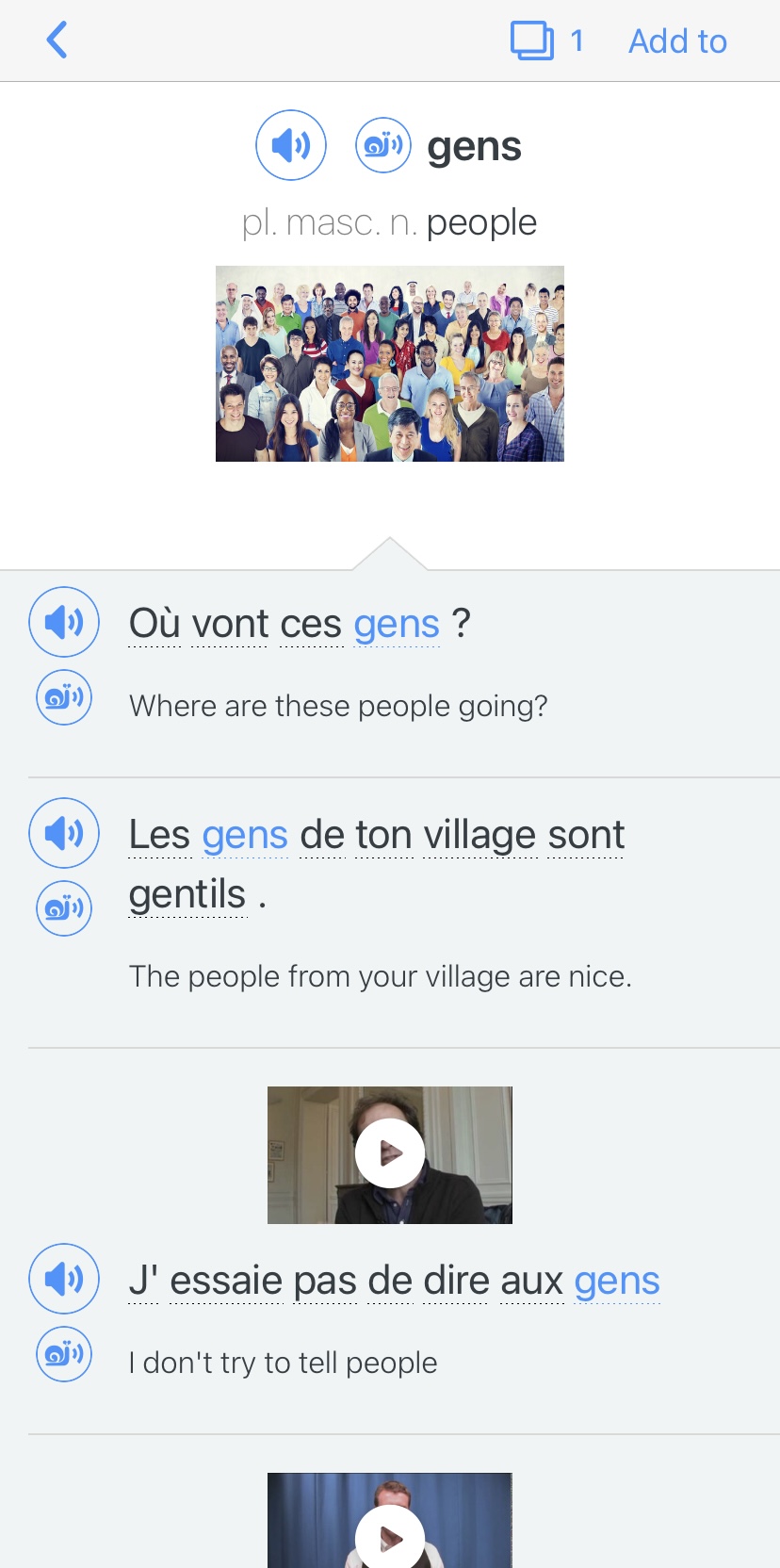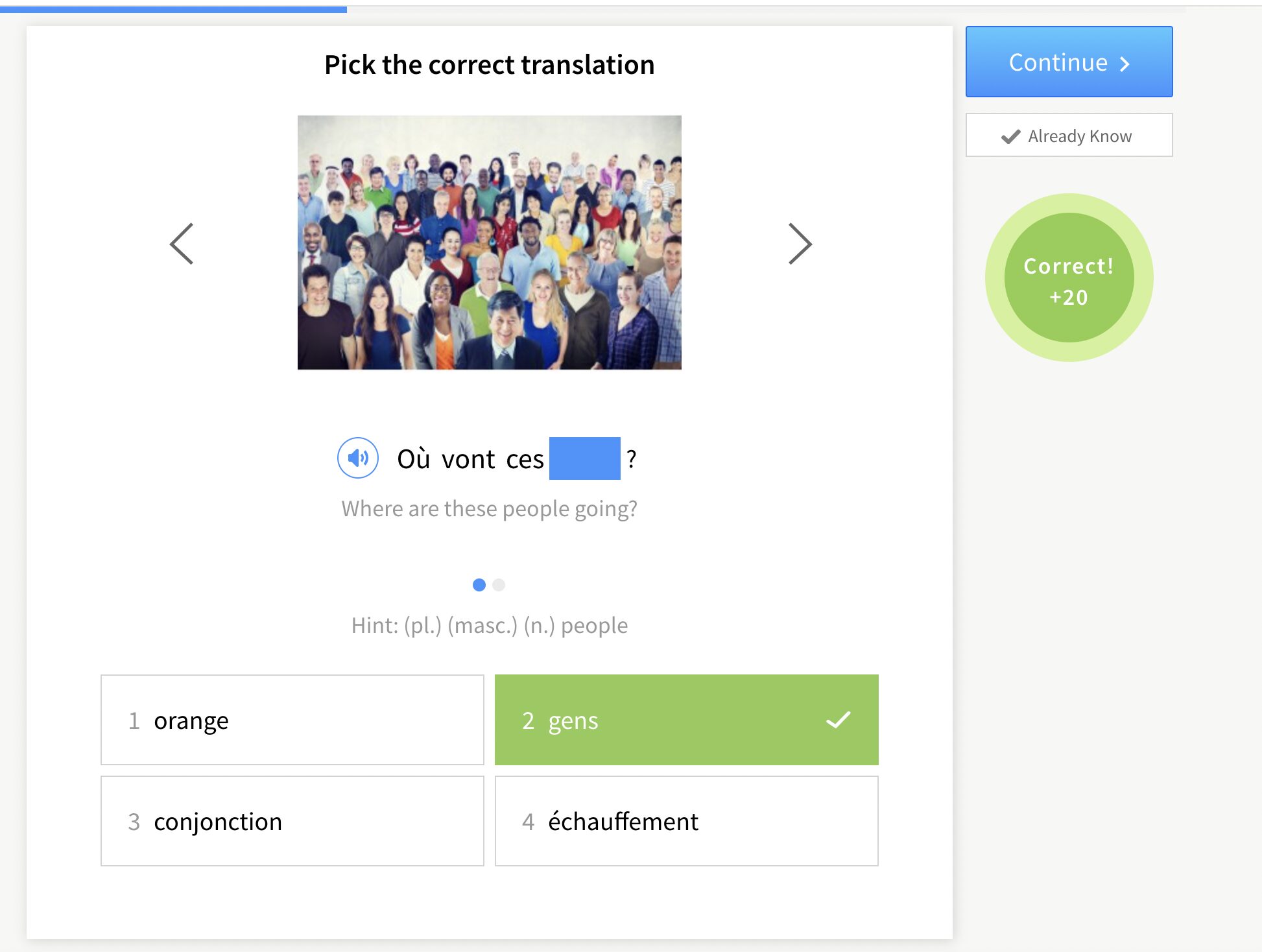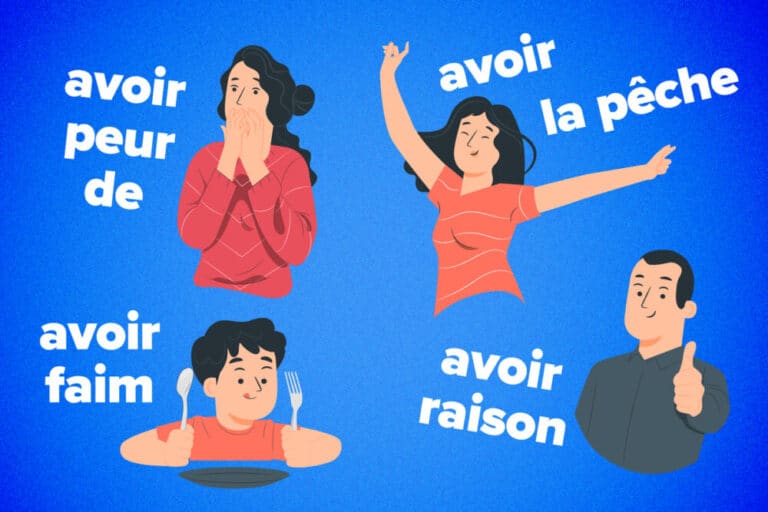Contents
- 1. Learn the Most Common French Vocabulary and Phrases
- 2. Mine Videos for Fun French Lessons
- 3. Listen to Authentic French Content as Often as Possible
- 4. Focus on Speaking French as Soon as Possible
- 5. Use French to Learn French
- 6. Learn French from Native Speakers
- 7. Establish a Consistent French Study Schedule
- Tips to Learn to French Fast
- And One More Thing…
How to Learn French Fast in 7 Efficient Steps

If you’re wondering how to learn French fast, know that it won’t be easy—but it is possible if you’re motivated, diligent and realistic about your goals.
I’ll show you how to get in the right mindset for quick success with French learning and share a seven-step plan for strategic, efficient learning.
For another perspective, you can also check out our YouTube channel for Kritika’s methods that sped up her learning:
Download: This blog post is available as a convenient and portable PDF that you can take anywhere. Click here to get a copy. (Download)
1. Learn the Most Common French Vocabulary and Phrases
Even native speakers don’t know every word in their language!
Instead of learning as many French words as possible, focus on learning very common, very useful words.
a. Decide how many words you’ll learn and which ones
If you know the 1,000 most frequent words in a language, you can understand 80% of that language!
That’s more than enough to be conversational in French. And you can learn 1,000 French words in six months by learning just six words a day.
Here are several resources that can help:
- This Wiktionary page lists 2,000 of the most common French words.
- The book “501 French Verbs” gives you the most frequent and important verbs.
- This post contains 500 of the most frequently used words in French plus three other places to find French frequency lists.
- This post contains over 100 common French phrases to help you start speaking.
You can also make personal vocabulary lists based on your French goals. Just write (in English) the words and phrases you want to learn. Then, find a reliable source (a dictionary, native French speaker, etc.) and translate your list into French.
You’ll also want to pay attention to French filler words.
French speakers use different verbal tics to fill speaking gaps in conversation: euh (umm), ben, oui (yes, of course), ben, non (of course not) and others.
Adopting these sounds yourself will quickly add a flair of fluency to your French.
Using French filler words will also:
- keep you in “French mode” when speaking.
- give your French speech native-like cadence and rhythm.
- cue native speakers to continue speaking to you in French.
b. Use study techniques to remember new vocabulary
The easiest way to memorize vocabulary is with flashcards.
You can do this with physical cards or a digital flashcard app. Anki, for example, sorts your cards automatically and uses a spaced repetition system to help you review old words.
You might also employ mnemonic devices to create connections that support memory. Try the book “French by Association,” which teaches basic French with word-association techniques.
2. Mine Videos for Fun French Lessons
Foreign language sentence mining is pulling sentences from authentic content to see how grammar and vocabulary are used in real life.
Scriptorium, a technique developed by Alexander Arguelles, consists of writing sentences while speaking them out loud.
Use videos, sentence mining and scriptorium to create your own French lessons.
a. Select French video sources and transcribe them every day
Videos provide more context than audio alone and they make learning more entertaining!
Your French video sources should:
- be genuinely interesting to you.
- have a transcript, “cheat sheet” or subtitles.
- cover topics you know well or movies you’ve already seen.
- have continuous French speech as it’s spoken in real life.
- feature a solid storyline to provide context.
- be high quality, like videos on Canal+.
Now, get ready to pause your video to transcribe what you heard.
The basic transcribing process:
- Write the date (for progress tracking).
- Play the video and listen carefully.
- When the sentence ends, pause the video.
- Write down the sentence. Speak each word aloud as you write it.
- Replay and pause as many times as needed until you’ve finished writing the sentence.
- Repeat this 10-20 times per day.
You might need a lot of replays. You might need to research something, consult a dictionary or ask a native French speaker some questions.
That’s okay! It’s part of the process, especially when you’re trying to learn how to speak French fast.
A few more tips:
- Use subtitles (English or French) as needed. Remember they may differ from the audio.
- Have a goal for each session, like 5-10 sentences.
- If you’re really stuck, move on! This should be like a fun puzzle, not an impossible homework assignment.
If you’re getting frustrated regularly, reconsider the level of your source material. If the material doesn’t seem to be the problem, try cutting back on the number of sentences.
You can use a program like FluentU to find videos suitable for your level at any stage of your learning.
FluentU takes authentic videos—like music videos, movie trailers, news and inspiring talks—and turns them into personalized language learning lessons.
You can try FluentU for free for 2 weeks. Check out the website or download the iOS app or Android app.
P.S. Click here to take advantage of our current sale! (Expires at the end of this month.)
b. Review sentences and return to videos periodically
Review every set of French sentences for 10 days to reinforce them in your brain. You can:
- Read along with audio
- Rewatch the video
- Act out both sides of the dialogue
- Pretend you’re the movie’s hero
- Turn the sentences into a song and sing them to your cat
Just make sure to review your sentences out loud and often.
After 10 days, you can “retire” the set. Once you’ve transcribed the whole video clip, you can retire that too.
In a month, try re-watching it. This is important for tracking your French progress and continuing it by maintaining base fluency.
Likely, when you watch the video again, you’ll be surprised by how much French you know!
That’s because memorizing grammar and vocabulary is noticeably more effective when it comes from entertaining French source material.
3. Listen to Authentic French Content as Often as Possible
Listening to authentic French content will expose you to the rhythm, cadences and intonations of native French speakers.
This will help you learn French more quickly, improve your comprehension and form good pronunciation habits.
a. Find authentic French content you enjoy
There are plenty of places to find all sorts of French content.
- Youtube‘s ever-growing library is home to high-quality French videos on pretty much any topic. Most have French subtitles too. Try Cyprien or Natoo for viral-type videos, e-penser for history and science videos or Mind Parachutes for self-improvement videos.
- French news outlets can help you keep up with the world in French. Many news providers offer both written and video news reports. Popular options include Le Monde (The World) and Radio français international (French International Radio).
- French music has a rich history and a dynamic contemporary landscape. You can find French music on Apple Music, Spotify and YouTube.
- Podcasts can often be listened to while you’re doing busy tasks. Try podcasts designed for French learners like Duolingo’s French podcast and News in Slow French, or find others via Spotify or PodBean.
- Watch your favorite TV shows and movies in French. Think “Friends,” “The Big Bang Theory,” “SpongeBob,” etc. When it comes to movies, you can find tons of classics dubbed in French—like Ratatouille.
b. Practice active listening
If you play French audio while you do chores, that’s passive listening. It’s good for exposure to French, but not much else.
To learn French at a high level, you need to practice active listening. This means you’re interacting with the French audio content in some way.
For example, you can do listening comprehension exercises by completing activities that test your understanding of the audio. Here’s an example:
In fact, this YouTube channel (Learn to French) has many listening comprehension videos. The website Lawless French has more listening comprehension practice.
You can also practice active listening by writing a summary of the audio or telling your friend about the audio content. For best practice, do these in French!
At higher levels of French, you might transcribe everything you hear (in French!) or interpret the audio (orally translating as you listen).
4. Focus on Speaking French as Soon as Possible
A common polyglot recommendation for learning languages is to speak early and often.
And if verbal communication is your end goal, tailor your studies to concentrate fully on spoken French rather than written French.
a. Learn to listen for the nuances of spoken French
French isn’t written the same as it’s spoken.
For example, nous technically means “we” in French. When speaking, however, most French people actually use the word on (which translates approximately to “one”).
Instead of saying Nous sommes allés au supermarché to say “We went to the supermarket,” French people would more likely say On est allé au supermarché.
If you attempt to learn written and spoken French at the same time, you’ll have to learn both ways of creating French sentences.
If, however, you focus on spoken French from the get-go, you’ll be speaking fluently far more quickly.
b. Come to terms with making mistakes
Focusing on spoken French does have its downsides. You may accidentally use spoken French in your writing when you do put pen to paper.
For instance, a native French speaker will usually say Je sais pas (or even ché pa) for “I don’t know.” In writing, though, you’d need to use the correct Je ne sais pas.
Studying spoken French means you’ll need to relearn the correct way of saying things later if you hope to write French properly.
Perhaps more concerning though—it’s scary to speak in a language you hardly know!
How do you know you’ll be understood? How do you know you’re not accidentally offending your conversation partner with some horrible French faux pas?
In short, you don’t.
Indeed, part of the fun of learning a new language is the mental gymnastics we sometimes have to do to make ourselves understood. With luck, your interlocutor will teach you le mot juste (the right word).
And that’s the real beauty of making mistakes—each one gets you closer to truly being able to express yourself in French.
5. Use French to Learn French
The sooner you start thinking in French, the quicker you’ll learn the language.
To help you move away from using English (or your native language), use as much French in your learning as possible.
a. Use lessons that are entirely in French
While it may seem counterintuitive, taking French lessons in French is an extremely useful and efficient way to learn the language—even for beginners!
This immersive environment lets you see the French language in use even as you study it.
Beyond the content of your lesson, you’ll learn French words, phrases, grammar constructions, intonation and pronunciation just by virtue of being taught in French.
To find these lessons, look for words like “immersion” and “in context” in course descriptions.
Here are some places you might find immersive French lessons:
- Official French organizations. L’alliance française (The French Alliance) offers in-person French courses.
- Tutoring websites. Ask your personal italki tutor to teach entirely in French.
- Frantastique. This online French course teaches completely in French and caters to your needs and level.
- YouTube. Français avec Pierre (French with Pierre) and Français authentique (Authentic French) offer French lessons for multiple levels, plus supplementary materials for paying members of their programs.
b. Utilize French learning tools
It’s good practice to use context clues to try to figure out unfamiliar words before checking the dictionary.
As you master core vocabulary and consume more French content, this process will become more natural.
Of course, when it’s impossible to figure something out without help, check the dictionary! Have a French-only dictionary on hand to clarify tricky words and phrases.
If you’re watching French videos, use French subtitles to learn new vocabulary using context clues. It’s an immersive learning practice that will boost your comprehension quickly.
Make sure to study the words and grammar constructs outside the video as well. In-depth definitions and example sentences will help you learn beyond what you can glean from the subtitle context.
6. Learn French from Native Speakers
A great way to combine a focus on speaking and learning in French is to talk directly to native French speakers.
Talking with native speakers will help you understand the flow of communication in French, as well as improve your listening, speaking and pronunciation skills.
a. Use online resources to communicate with native speakers
If you’re in the middle of an English-speaking country, using the internet to find native French speakers is a must. Fortunately, there are plenty of sites that put you in contact with francophones without the need to leave your bedroom!
- InterPals helps people make friends all over the world. Users on this site might be looking for a variety of connections, such as friends, pen-pals, travel buddies or language exchanges. You can filter users by language or country of origin to make your search for French speakers more efficient.
- French-language forums can help you find people to talk to about anything you might interested in. Chat forums can also help you learn French slang, text-speak and more casual forms of written communication, though this is best for intermediate and advanced learners.
- Language.Exchange can connect you to French speakers all over the world. You can filter people by country and even city to find someone close to you. There’s also the option to find users who want to do language exchange over Whatsapp for ease of connection.
b. Meet French speakers in your city or abroad
If you have the advantage of living in a city, your language learning quest will be easier. One important reason for this is that cities attract more foreigners, including French speakers.
But even less populated areas are bound to have some French speakers too, especially if you’re located near a college or university. Here’s how to find those people:
- French Meetup Groups. Most major cities in the U.S. and other English-speaking nations have French-speaking Meetup groups that anyone can join. I attended one in Washington D.C., and there’s options in Chicago, San Francisco and New York as well.
- French clubs at your local university. Almost all foreign language departments have language clubs that operate much like Meetup groups. It’s a great way to practice with language educators and native speakers, and most groups are open to the public!
- The Alliance Française. This French organization has chapters all over the U.S. as well as internationally. Their focus is to get you speaking and understanding French in a relaxed environment. Costs are comparable to community college course fees.
Of course, if you have the means and time to travel, the hands-down best way to get in contact with native speakers is to simply go where they live!
There are plenty of places that speak French natively, but here are three I recommend to help you learn French fast:
- Quebec, Canada. Quebec can be a wonderful destination for talking with native speakers if France is a bit too far. While Montreal has an easier accent for French learners to grasp, the Québécois are less likely to switch to English.
- Communities in the U.S. No kidding! Southern Louisiana, for example, is also known as Acadiana, where you can experience the unique Cajun culture and their efforts to preserve their unique French derived from the Acadian dialect.
- Rural France. You may have dreams of seeing Paris, and you should. But as France’s premier tourist destination, there’s a lot of English. Rural France offers interaction with native speakers in a more English-free environment. I personally recommend southern France for learners, as the French there tends to be a little slower.
7. Establish a Consistent French Study Schedule
Consistency is key in language learning, just as it is in exercising. A 20-minute jog every day is better than a three-hour cardio session every two weeks.
When learning French, you have to break it into manageable segments and keep up regular practice to see long-term results.
a. Set realistic goals and a specific schedule
You need more to work with than “I want to speak French.”
For example: “During my next lesson with my tutor, I want to talk about the weather completely in French.”
This works because it follows the STAR method. It’s:
- Specific—you want to talk about a particular topic
- Testable—you’ll see how well you can communicate during the conversation
- Attainable—you have a reasonable time period to accomplish the task
- Relevant—the weather is a common topic for beginners
And I know you want to learn French fast, but you don’t need to rush yourself.
It takes English speakers 600-750 hours to learn French to a “professional working proficiency” level (roughly intermediate).
Again, keep in mind that your brain benefits more from short, frequent study sessions rather than longer, infrequent ones. Two hours a day five days a week is more helpful than five hours a day twice a week.
Worried you don’t have enough time? Consider this daily French study schedule:
- 30 minutes before/during breakfast—read in French
- one hour during your commute—listen to a French podcast
- 20 minutes during downtime—use French learning apps
- 40 minutes during lunch—create flashcards and write in French
- one hour during dinner—watch French videos
- one hour in the evening—active learning (review, transcribe from audio, study grammar, practice speaking French with a native speaker, etc.)
You don’t need to practice every skill every day, but try to split your time evenly between reading, writing, listening, speaking and grammar.
However you organize your learning, be intentional about what you’ll accomplish in each study session.
b. Stick with your plan
Your motivation for learning French will wax and wane. This is natural, and there are ways to remedy a loss of motivation.
- Change it up. Don’t get bored! Try a new app, go to a new class or use a different learning method.
- Skip it. French can be complicated. Rather than toiling away at something hard, move on. It will likely make more sense later.
- Have fun! Find apps that are engaging, play games that are fun and stick to topics that interest you.
- Don’t give up. Learning a language is hard and not always immediately rewarding. Remind yourself why you want to learn French. You got this!
Tips to Learn to French Fast
As you can see, simply diving into any old textbook won’t give you the direction and motivation you need to achieve your goal.
Here are three key steps to prepare yourself for learning French quickly:
1. Establish your learning goal
Ask yourself, “Why do I want to learn French?” Your answer will help you structure your study plan by highlighting the concepts and vocabulary you should spend time on.
If you want to relocate to a French-speaking country for a job, you’d want to focus primarily on French business vocabulary.
If you want to communicate with in-laws or friends, you’d be more interested in studying conversational French.
2. Surround yourself with French material
To learn quickly, you need to make the most of every minute. Create an immersive atmosphere to live and breathe French.
At the gym or stuck in traffic? Listen to French podcasts. Have time to kill? Watch French TV and films. Download a dictionary and flashcard app to look up and review words on the go.
Find a native French speaker to chat with regularly. Start your search by attending a French conversation meetup in your area.
3. Keep an open mind
To learn a new language, you have to check your perfectionism and timidity at the door—especially if you want to learn quickly.
It can be especially intimidating to talk in French to native speakers, but doing so gives you a ton of advantages:
- You’ll better understand spoken French.
- Your own French will sound more authentic.
- You’ll make new friends and great memories.
Try to be curious, unabashed, adventurous and ask questions every chance you get.
Some essential phrases to have in your French learner’s arsenal:
- Comment dit-on ___ en Français? (How do you say ___ in French?)
- Qu’est-ce que c’est? (What is it?)
- Je ne comprends pas. (I don’t understand.)
You now know how to learn French fast… with the above tips and tools!
Go forth and learn, and I bet you’ll be amazed at how much you discover, even in a short amount of time.
Download: This blog post is available as a convenient and portable PDF that you can take anywhere. Click here to get a copy. (Download)
And One More Thing…
If you’re like me and prefer learning French on your own time, from the comfort of your smart device, I’ve got something you’ll love.
With FluentU’s Chrome Extension, you can turn any YouTube or Netflix video with subtitles into an interactive language lesson. That means you can learn French from real-world content, just as native speakers actually use it.
You can even import your favorite YouTube videos into your FluentU account. If you’re not sure where to start, check out our curated library of videos that are handpicked for beginners and intermediate learners, as you can see here:
FluentU brings native French videos within reach. With interactive captions, you can hover over any word to see its meaning along with an image, audio pronunciation, and grammatical information.
Click on a word to see example sentences and other videos where it's used in different contexts, then add it to your flashcards. For example, if I tap on the word "gens," this is what pops up:
Want to make sure you remember what you've learned? We’ve got you covered. Each video comes with exercises to review and reinforce key vocab. You’ll get extra practice with tricky words and be reminded when it’s time to review so nothing slips through the cracks.
The best part? FluentU tracks everything you’re learning and uses that to create a personalized experience just for you. Start using the FluentU website on your computer or tablet or, better yet, download our app from the App Store or Google Play.
Click here to take advantage of our current sale! (Expires at the end of this month.)



















